It's official! Spring has finally arrived, and we have been enjoying some beautiful weather here at the Crossroads. We started several large projects last week, but I managed to find some time to tidy up my herb garden.
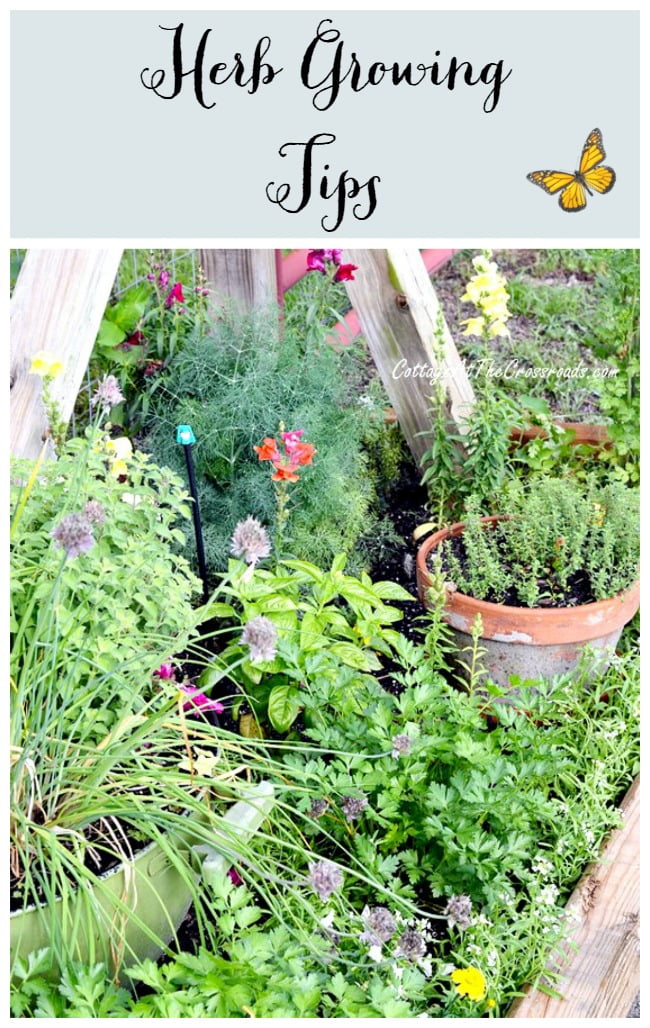
And I thought that I would pass along some herb growing tips since some of you may be thinking about growing some herbs, too.
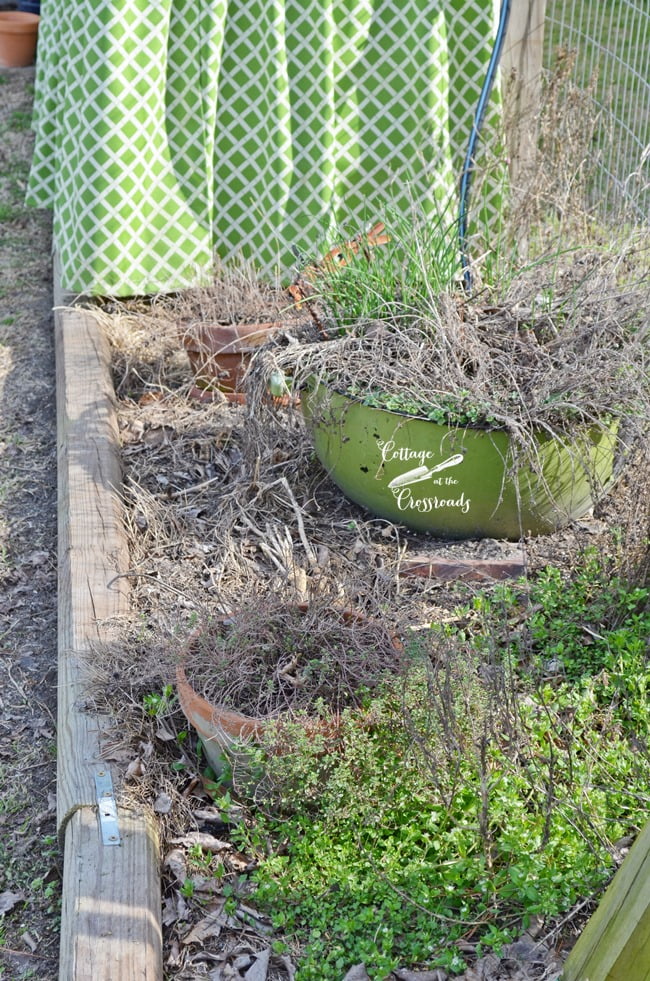
This is what my herb bed, which is located inside our vegetable garden, looked like before I spent a little time in it this week. It felt good to get the winter weeds pulled, the dead material cleaned out, and the soil prepared for planting. You can see a little green poking out from the old BBQ grill where the perennial herbs are beginning to grow again.
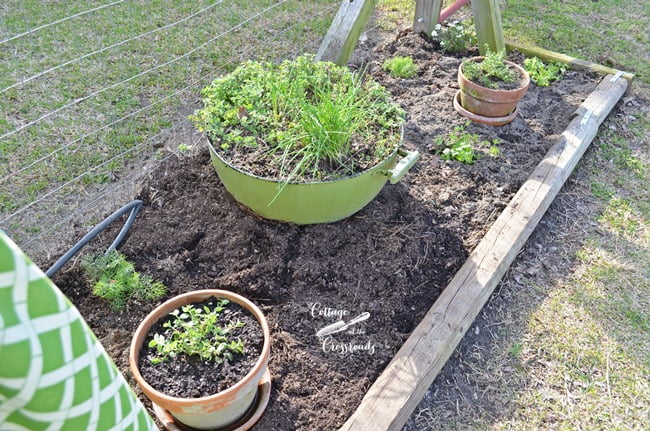
What an amazing difference, right?
Just about any food tastes better when prepared with fresh herbs, and there's no better way to get them than to grow them yourself. And most culinary herbs are easy to grow with minimum effort and can be successfully grown in containers or in the ground.
My herb bed measures about 3 feet x 7 feet so you can see that you don't need a lot of space. And there's a reason why I put some of my herbs in containers and some go in the ground.
So if you want to grow some herbs, just follow these tips below and you'll have more than enough for you and your family.
1. Choose a sunny spot with good drainage
Most herbs love the sun and don't want to be too wet. Whether you are using containers or are planting your herbs in the ground, you must make sure that the soil drains. If you're using pots, just fill them with regular potting soil. But if you're planting in the ground, make sure that you're not planting your herbs in a boggy spot.
2. Don't make the soil too rich or fertilize too much
Herbs are used to growing in "lean" soils so you don't really need to amend your soil unless you adding sand to help with drainage. I added a shovel full of our compost to my bed only because I grew herbs in this spot last year. Otherwise, I never fertilize them through the growing season. However, if you grow your herbs in pots, you may need to add a weak solution of fertilizer to your plants after about 6 weeks since watering will leach out the minerals in your soil.
3. Know which herbs are perennials and which are annuals
When thinking about which herbs you want to grow, it's nice to know that once you get some of them established, you can enjoy them for a number of years. Some common herbs that are perennial in most areas are rosemary, chives, thyme, and mint.
4. Locate your herbs close to your kitchen
The more accessible your herbs are, the more likely you are to use them in cooking. Growing some in window boxes or pots near your back door are the best places as long as you have plenty of sun. There's nothing better than walking outside and picking some of your own fresh herbs to use in a dish.
5. Plant seedlings rather than sowing seeds
Many herbs are easy to grow from seed, but the problem is that you will have WAY more plants than you need if you start with seeds. For about the same price as a packet of seeds, you can buy a seedling and will be able to harvest much more quickly. If you grow from seeds, you will have to thin your herbs and it is always really, really hard for me to thin something that's already growing. Plus, I have found that having one or two plants of each type of herb is more than plenty.
6. If you've never grown herbs, start with basil
Basil is such a wonderful herb to start with for many reasons. Wait until the soil is warm to plant it. A good rule of thumb is to plant basil about the same time that tomatoes are planted which would be after all danger of frost has passed.Basil is the perfect compliment for so many summer dishes and it's easy to grow even if you don't know what you're doing! It does well in pots or in the ground but allow at least 1 foot of space for your plant. Basil will tell you when it needs watering. It will get a little droopy but it will recover nicely when it gets water. Harvest leaves from the top rather than the bottom and if you pinch off new growth right ABOVE a spot where you see new leaves sprouting from the stem, you'll create a bushier, more compact plant. Harvest often to keep it in its growing cycle, and if you see a flower, snip it off.
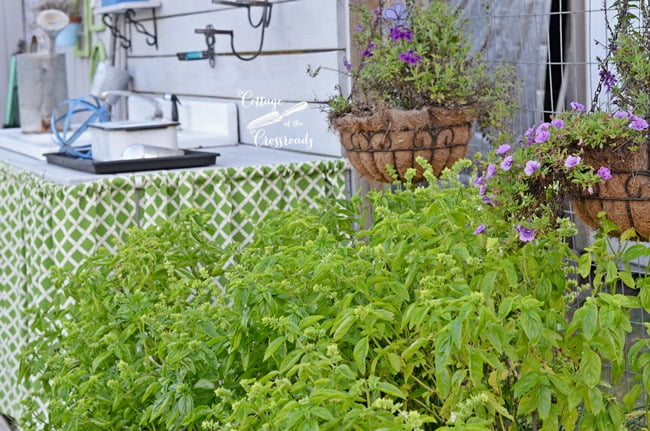
This photo was taken last October. As you can see, basil plants can get quite large and I had gotten lax in snipping off those flowers. That's ok because bees love them.
7. Know that some herbs are invasive
There are a few herbs that will spread and take over a garden spot! Mint is especially invasive. I have mine planted in a concrete pot that doesn't even have a drainage hole. Mint must be planted in pots to contain it, and be sure keep a saucer under the pot as well. The roots will climb out the drainage hole and the next thing you know, you will have mint sprigs popping up everywhere! Also, don't put mint in a pot with other herbs because it will just take them over. Chives, oregano, and thyme will spread as well so it's best to grow them in containers.
8. Don't over-water herbs
Most herbs like to be kept on the dry side. Over-watering can be just as bad as under-watering. The exceptions are mint and cilantro. They seem to require a little more water than others. But keep in mind that plants planted in clay pots will dry out much more quickly in hot weather than others. Just stick your finger down in the soil about 2 inches, and if it's dry, your plant needs water.
9. Allow plenty of space for your plants
Be sure to read the labels on your herbs to determine space requirements, but here is a good guide. Allow 3-4 feet for rosemary, sage, mint, oregano, and marjoram. Basil, thyme, and tarragon need at least 2 feet with cilantro, chives, dill, and parsley requiring 1 foot.
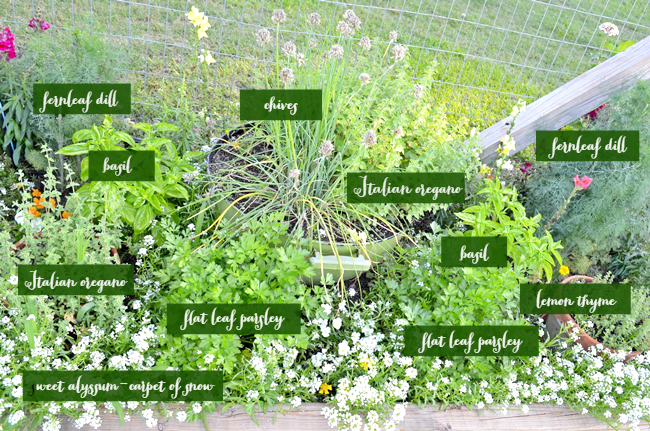
If you are planting your herbs in the ground, it is a good idea to sketch out your area to make sure you're allowing enough space for them. In my small area, I usually plant 2 of everything except for lemon thyme and cilantro. I've always found that 1 of each of those is always enough.
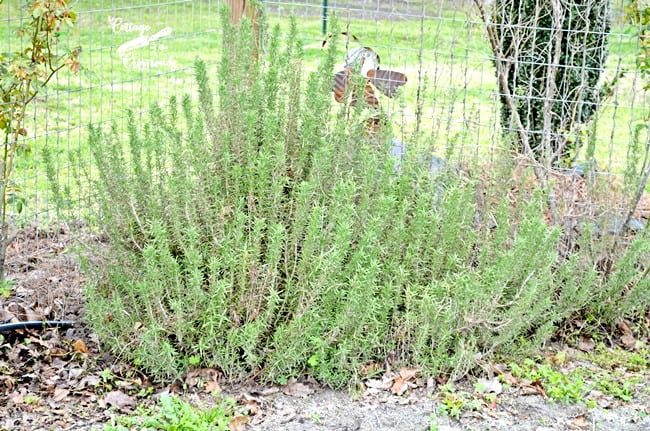
My one rosemary bush is located in a different corner of the garden. It's about 4 years old at this point, but you can see how much it spreads.
10. Plant cilantro early in the spring
Cilantro likes cool weather so it's best to grow it from a seedling rather from seeds in our area. When it gets hot here, cilantro goes to seed very quickly. I just usually pull it out of my bed, allowing more space for something else to grow. Cilantro is one of those herbs that people either hate or love. Did you know that people are genetically predisposed to either like it or not? And a few people are allergic to it. Cilantro is a natural cleansing agent and some people consume large amounts of it in order to cleanse their bodies of toxins. But consuming too much of it can be very dangerous!
11. Harvest early in the morning with scissors
Once you get your herbs growing, harvest them early in the morning just after the dew has dried. That's when the essentials oils and flavors are most concentrated. Using scissors helps you to make clean cuts instead of mangling the stems.
12. Plant flowers among your herbs
Ok, this is not really a growing tip but one I just like. Last year I interspersed flowers such as violas, marigolds, nasturtiums, snapdragons, and English daisies among the herbs, and they added so much color and interest to the herb bed.
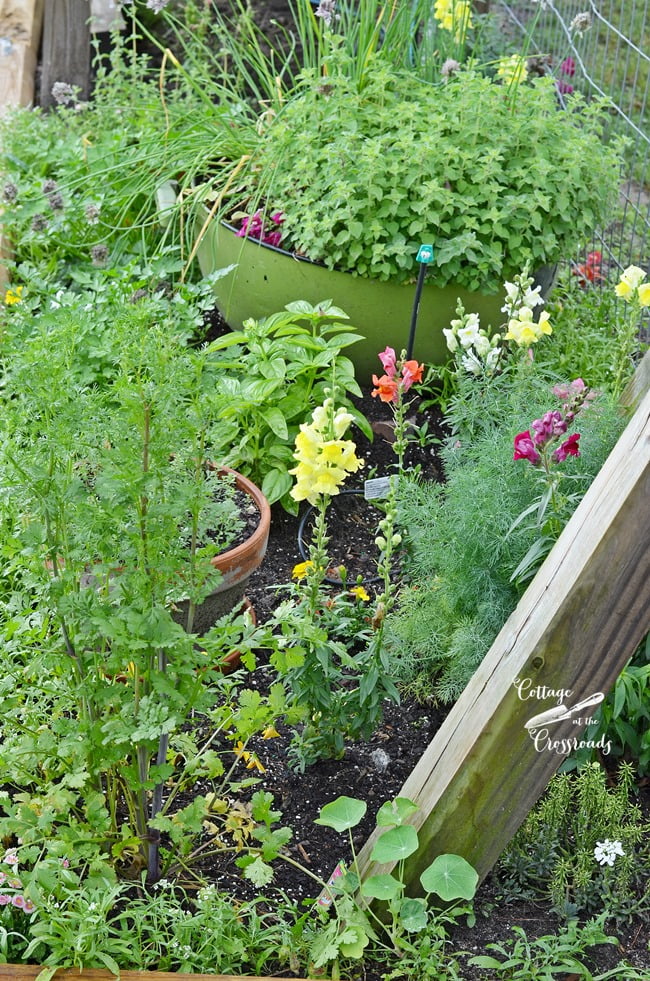
Pretty, huh?
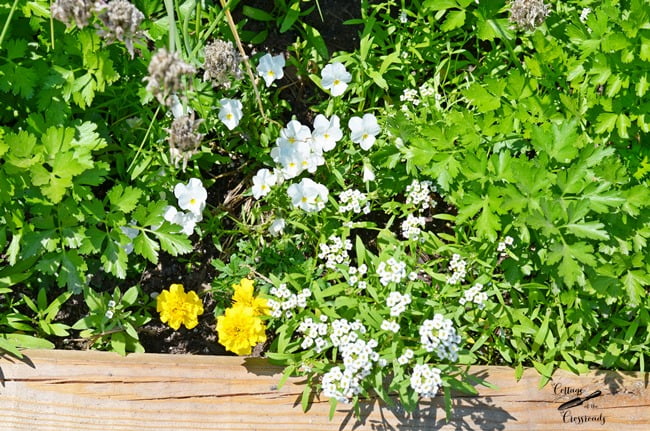
But the prettiest thing that I did was to throw some sweet alyssum seeds, aka "Clouds of Snow" into the bed.
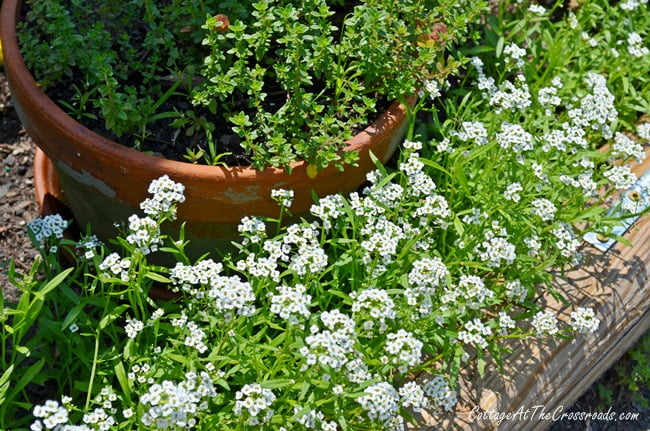
I put a lot of seeds along the landscaping timbers which edge the bed, and the sweet alyssum softened the edges and bloomed all summer.
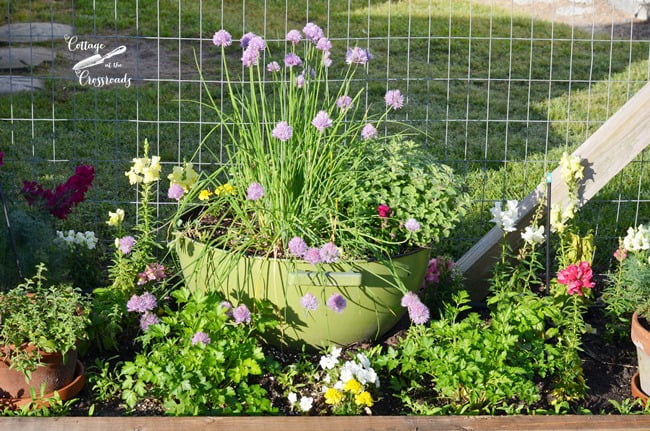
And speaking of pretty flowers, look at these chive flowers!
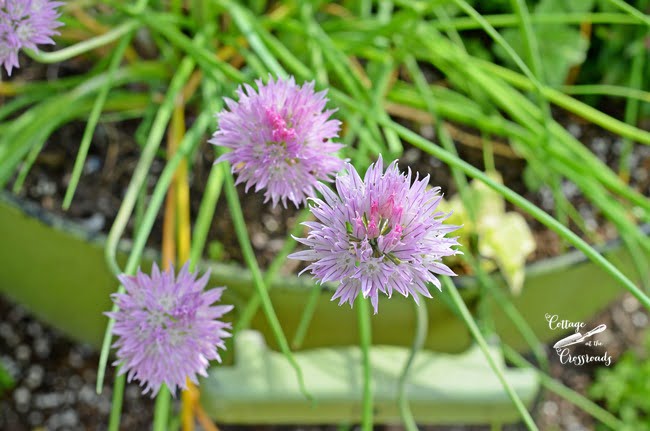
So gorgeous and totally edible!
Not only do herbs enhance the taste of foods, they are nutritionally good for you. I hope my herb growing tips get you started growing your own!

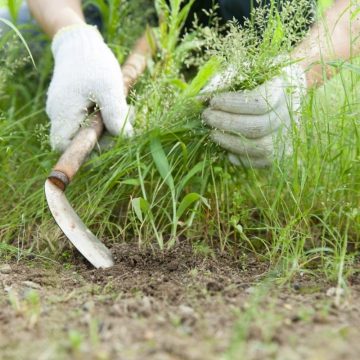
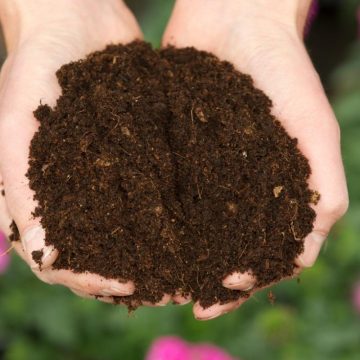
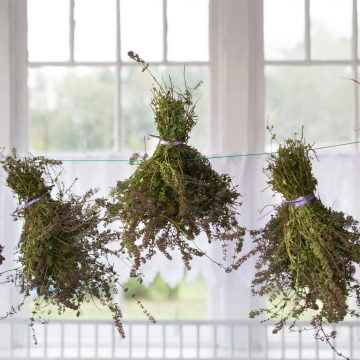
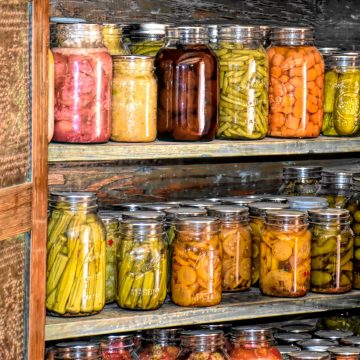
Stacey
I think you've convinced me. I love fresh basil, rosemary, and thyme.
I joined a Monarch Butterfly Initiative in our town this week. Did you know parsley is a favorite of Swallowtail Butterflies? I'd love that!
Denise
Love Love Love this post! It made me want to start an herb garden! Thanks for all the great tips!
I have a hard time thinning tiny plants from seeds too!
Nancy @ A Joyful Cottage
Thanks for the good tips. I like to grow a variety of basil, and always plant Purple Ruffle for its color. But my favorite to eat is Genovese basil paired with fresh home grown tomatoes. Nothing better, in my estimation. Enjoy the rest of your week.
Mary
Great tips Jane! I cleaned out and trimmed up our herb bed a couple of weeks ago and I'm ready to plant some basil after our freeze date here. Alas, my mint climbed through my pot and is off and running everywhere. Love your pretty sweet alyssum, I'm going to pick up some seeds 🙂
Kim
Great tips, Jane. Now, if I could only get hubby interested again in gardening.
Martie Brown
That is a "saver". Thank you so much.
Jolene
Love all your posts, I just found you today and I can't stop reading and looking at your pictures! I'm a first time gardener this year. Started seeds about 4 weeks ago in the house. I've got a variety of herbs I'm going to have as well. My main question is what do I do with the herbs, such as chives/oregano/mint that are best in containers, over the winter? I also will have a few pots of lavender that I would like to come back... just don't know how to care for them in the winter. Bring the pots in? Leave them out? I'm border of zones 4/5 or in your graph posted on your site I believe I'm in 4b.
liz
First, go to the library and look through their garden section for information. If you find a book that you like, you can always buy it later as your go-to reference book. There are more books which are being written for a specific area which helps in buying, or not buying, a specific plant. You may have a local nursery having "how-to" classes.
Then, start a simple journal noting when and where you planted the herbs and experiment with placement. In every yard, there are micro climates with variations in sun, wind, temperature, water flow. I've put herbs in places they were not supposed to grow and they are still there! And, I've realized that I just can't remember how things are growing without some notes.
If you do have herbs in pots and they are supposed to overwinter in your area, you can always dig the pot into the ground to give the roots some protection. With chives, most propagate by seed so, it's important to watch for the flowers and not let them go to seed. Same with oregano - watch for the smaller, less flashy flowers and trim them. I don't have luck with mints or lavenders.
One thing to remember with perennials - first they sleep, then they creep and then they LEAP! So, a plant may look innocent in year 1 and 2 of their growth, but then explode in size when you have already planted something nearby. That's when you become the lady who digs up and gives starter plants to anyone!
Catherine
You have inspired me greatly! However we have to wait for several more inches of snow to melt before we can get started. Enjoy your garden!
liz
Herbs don't have to be in a special bed - I plant mine all over the garden. Oregano and thyme can be some pretty border plants. I have rosemary all over the place. It's been fun to see which plants do well in different locations in my garden.
Dolly
Beautiful herbs can't wait for this year. You have inspired me to make my herb garden a little bigger. Great tips. thanks for all of the pointers.
Jean Windham
Jane, I cannot wait to start planting herbs again. Your post has inspired me to start as soon as i get the house completed. I probably won't make it this year but maybe next. The post was very informative and pretty too. I loved the addition of adding flowers to the mix of herbs. Thank you for sharing. Jean
Shirley@Housepitality Designs
Thanks for the tips Jane...I remember planting mint years ago and it just over took everything...Going to try my hand at some basil this year....I so love your gorgeous garden!
Crystal
I have tried to grow basil in my garden window in the winter. I don't have any luck. I live in Chicago and the garden window faces west. Any suggestions?
Ann
This is the best post and I agree that the perfect place to start is with basil. It seems to grow no matter how it is abused! I have never planted any herbs in the soil...only in pots. I may plant some Rosemary this year and see if it comes back. Loved this!
Marcie
Thank you for the tips. I'm planting Rosemary, tyme and basil today all in pots for the patio. Hope they grow. Chive have re-emerged again I think this pot is about 5 years old. I love fresh herbs.
Kathleen
I love your informative article. I was just going to gather ideas for herb planting and ran across you!
Thank you so much!!
Kathleen
Dawn
After seeing your pretty herb garden yesterday it inspired me to go out and fertilize my just peeking out of the ground herbs. Lovely post I enjoyed all the helpful tips.